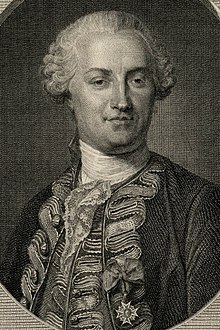Augustin de Saint-Aubin
Augustin de Saint-Aubin | |
|---|---|
 Self portrait Augustin de Saint-Aubin, 1764 | |
| Born | 3 January 1736 Paris, France |
| Died | 9 November 1807 (aged 71) Paris, France |
| Nationality | French |
| Occupation | engraver |
| Years active | 1752-1800 |
Augustin de Saint-Aubin sometimes styled Auguste de Saint-Aubin (3 January 1736 - 9 November 1807), belongs to an important dynasty of French designers and engravers.
Biography
Augustin de Saint-Aubin was born on 3 January 1736 in Paris to the king's embroiderer Gabriel Germain de Saint-Aubin (1696-1756).[1] He came from a family of artists and designers, which included his six siblings: brothers Charles-Germain de Saint-Aubin and Gabriel-Jacques de Saint-Aubin, as well as Catherine Louise, Louis-Michel, Athanasius, and Agathe, who were collectively known as the "Book of Saint-Aubin".[2]
Trained by his brother, he later studied with Étienne Fessard, Nicolas-Henry Tardieu [1] and Laurent Cars. His first submission to the Salon was an etching in 1752.[3] He was approved by the Académie Royale in 1771, but did not graduate, as he failed to submit one of the required reception pieces.[1] He took many commissions for commercial purposes like bookplates, frontpieces, invitations, tradesmen’s cards, and programs,[4] but also illustrated books such as the Decameron by Boccaccio.[3]
In 1776 he was appointed as the official engraver at the Bibliothèque Royale (Royal Library). He later worked on etching the collection of antique gems owned by the Duc d'Orléans.[1] Emmanuel Bocher’s 1879 catalog contains over 1300 works by Augustin, but he is most remembered for his portraits[1] and his engravings of portraits by Charles-Nicolas Cochin the younger (1715-1790).[3] In his lifetime, Augustin was considered the most successful of the siblings, but he is the one about whom least is now known.[5]
He was married to Louise-Nicole Godeau.[5] He died 9 November 1807 in Paris.[2]
Selected works
Drawings

- L'indiscrétion vengée
- Scène dans un intérieur rustique: jeune femme implorant le roi. Paris, Louvre Museum.
- Portrait de Rochambeau. Bayonne, Musée Bonnat.
- Feu d'artifice au bal de Saint-Cloud chez Griel, 1759. Paris, Louvre Museum.
- Portrait de Vivant-Dominique, baron Denon (1747-1825) de profil. Paris, Louvre Museum.
- Bal à Saint-Cloud chez Griel. Paris, Louvre Museum.
- Portrait d'une femme dans une chaise. University of Michigan Museum of Art.
- Dans le Livre des Saint-Aubin. Paris, Louvre Museum.
Engravings

- Portrait de Jean-François Marmontel illustrating his Contes moraux.
- Card to gain entry to the Concert bourgeois de la rue Saint-Antoine.
- L'art du brodeur. Museum of Fine Arts, Boston
- Galerie des Modes et Costumes Français in 3 volumes Museum of Fine Arts, Boston.
- Gravure d'après Gravelot (equestrian statue). Rothschild Collection, Paris, Louvre Museum.
- Jean-Baptiste-Joseph Languet de Gercy, parish priest of the Church of Saint-Sulpice, Paris, Doctor of the Sorbonne (1675-1750). He is the brother of Jean-Joseph Languet de Gergy. Versailles, Palace of Versailles and Grand Trianon.
- Marquise de Pompadour (1722-1764). Versailles, Palace of Versailles and Grand Trianon.
- Jean-Baptiste Lully, superintendent of the king's music (1633-1687). Versailles, Palace of Versailles and Grand Trianon.
- Thomas Corneille (1625-1709), writer and playwright. Versailles, Palace of Versailles and Grand Trianon.
- Louis Bourdaloue, Jesuit and preacher (mort en 1707). Versailles, Palace of Versailles and Grand Trianon.
- Antoine-Jean Amelot de Chaillou, Secretary of State from 1776 to 1783. Versailles, Palace of Versailles and Grand Trianon.
- Allegory with Louis XVI and the Constitution. Versailles, Palace of Versailles and Grand Trianon.
- Tribute to the beneficent views of the National Constituent Assembly and the loyalty of Louis XVI, circa 1791. Rothschild Collection, Paris, Louvre Museum.
- Le Bal paré. Rothschild Collection, Paris, Louvre Museum.
- C'est ici les différents jeux des petits Polissons de Paris: le sabot. Rothschild Collection, Paris, Louvre Museum.
- Benjamin Franklin (1706-1790), scholar and Minister Plenipotentiary of the United States of America to the Court of France. Blérancourt, National Museum of French-American Friendship and Cooperation.
Further reading
- Rosenberg, Pierre. Le livre des Saint-AubinParis: Réunion des Musées Nationaux (2002) (ISBN 2-7118-4611-3)
References
- ^ a b c d e Fahy, Everett (editor); Wrightsman, Jayne (editor) (2005). The Wrightsman pictures. New York: Metropolitan Museum of Art. p. 222. ISBN 1-58839-144-2. Retrieved 23 June 2015.
{{cite book}}:|first1=has generic name (help) - ^ a b "Augustin de Saint-Aubin (1736-1807)". Data BNF France (in French). France: Bibliothèque Nationale de France. Retrieved 23 June 2015.
- ^ a b c "Le Concert (The Concert) by L. Provost, 19th-century engraver [article]". Library of Congress. Washington, DC: Library of Congress. Retrieved 23 June 2015.
- ^ Metropolitan Museum of Art (1999). The Robert Lehman Collection. New York: Metropolitan Museum of Art. pp. 356–358. ISBN 978-0-870-99918-5. Retrieved 23 June 2015.
- ^ a b "Огюстен де Сент-Обен: Augustin de Saint-Aubin". Marty de Cambiaire. Russia: Marty de Cambiaire. Retrieved 23 June 2015.
